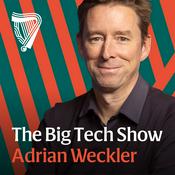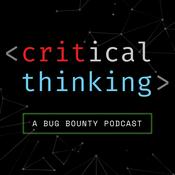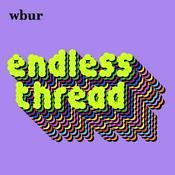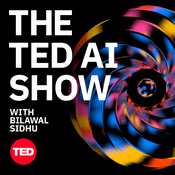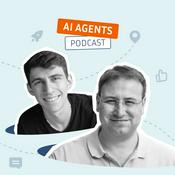Available Episodes
5 of 181
- Update from the Digital Human TeamThe Digital Human is pausing to focus on what everyone's talking about - AI. Join Aleks and her co-host Kevin Fong for The Artifical Human from BBC Radio 4, listen on BBC Sounds.--------1:07
- Reminiscence‘I asked myself this very question after a family member was affected by dementia. In her later years, the only person my grandmother still remembered was her husband – but he had passed away several years earlier. She asked about him every morning and finding out that he had died always upset her greatly.’ - Thomas Nørmark.Thomas Nørmark Dementia is a cruel and complex illness, one that robs individuals of their cognitive abilities, independence, and memories. The NHS website reports that in the UK alone, there are now over 944,000 people living with dementia, and this number continues to rise as our population ages.While there is no cure for dementia, emerging technological breakthroughs hold the promise of more personalised treatment plans, the potential to enhance the quality of life for longer periods, and the ability to provide much-needed respite and comfort to the caregivers of those affected.In this episode of Digital Human, Aleks explores some of the nascent AI tools that could help people living with dementia: AMPER, an AI programme designed to aid in Reminiscence therapy, helping people to remain independent for as long as possible. Moments, an app that creates timelines of memories, music, and photos that can be shared with clinical staff, so they can get to know who the person was before the disease took hold, meaning they can tailor care more effectively.And a radical proposition of creating Digital Avatars of loved ones that offer support and reassurance to people who no longer remember that that loved one has already passed away - saving family members from the emotional strain of having to pretend to be someone else, to keep the person they love happy.Aleks will explore not only how these technological developments will benefit people in the next few decades, but also the ethical complexities that arise in ensuring the well being and security of vulnerable users.--------29:04
- PermanenceAleks Krotoski explores a story which sought to be forgotten, but wasn't. Agrippa (A Book of the Dead), was published in 1992. It was a book designed to decay from its very first use. It was an unusual conceit, and played into our fears about malfunctioning technology ahead of the dawning millennium. The book was created by publisher Kevin Begos Jr, artist Dennis Ashbaugh and writer William Gibson. The writing – a 302 line poem – was stored on a floppy disc within the publication. It would lock after play, meaning the user could experience the work only once. Dennis Ashbaugh’s art work was similarly motivated. His images distorted if touched. These qualities tied in with Agrippa’s dominant theme. Gibson’s poem centred on the loss of his father. The name Agrippa (A Book of the Dead) referred to the photo album in his family home. It was produced by Kodak, and the particular volume was called Agrippa. Inside the album, there were visual reminders of all those who’d gone before. They provided memories, of sorts, for Gibson, and his autobiographical poem centres on those images. With thanks to The Bodleian Library in Oxford, and to all of our contributors in this programme: Justine Provino, Dr Huw Twiston Davies, Dr Chris Fletcher, Professor Maureen Ritchey and Dr Laura King. Presenter: Aleks Krotoski Producer: Victoria McArthur Researcher: Juliet Conway--------27:57
- CursedEmails from friends should be safe. From a trusted friend especially. Hey, Aleks, check out this cool attachment. The message is a bit brief, sure, but you check that it isn’t a phishing account masquerading as a friend, it doesn’t seem like a hack. And the image, Smile.JPG, sounds like it might be something silly but cute. So ok, you open it up.And you see… dog… smiling. A smiling dog, with human teeth.Now the dog haunts your dreams, with it’s terrible human but inhuman smile, promising to leave you be if only you’d ‘spread the word’.For this Halloween Aleks traces the origin of curses in the online world, discovering what Smile Dog reveals about our subconscious fears, our own culpability in sharing anything and everything online, and how the evolution, and disintegration, of this iconic curse sheds light onto something deeper - the rot of the internet itself, and the possibility that we may all now exist within a cursed internet.--------28:51
- SubvertAleks Krotoski explores culture jamming in the digital world. Once used by "communications guerillas" to subvert corporate advertising, it's now taken on a new life online...--------28:08
More Technology podcasts
Trending Technology podcasts
About The Digital Human
Aleks Krotoski explores the digital world
Podcast websiteListen to The Digital Human, The Big Tech Show and many other podcasts from around the world with the radio.net app

Get the free radio.net app
- Stations and podcasts to bookmark
- Stream via Wi-Fi or Bluetooth
- Supports Carplay & Android Auto
- Many other app features
Get the free radio.net app
- Stations and podcasts to bookmark
- Stream via Wi-Fi or Bluetooth
- Supports Carplay & Android Auto
- Many other app features


The Digital Human
Scan code,
download the app,
start listening.
download the app,
start listening.
